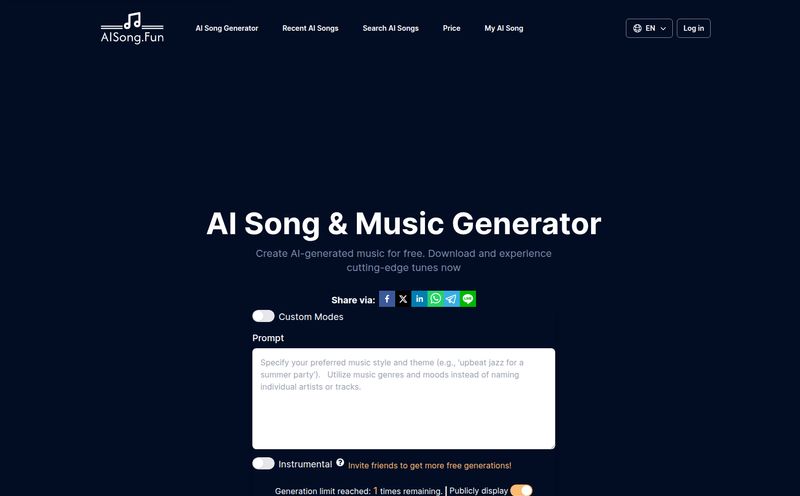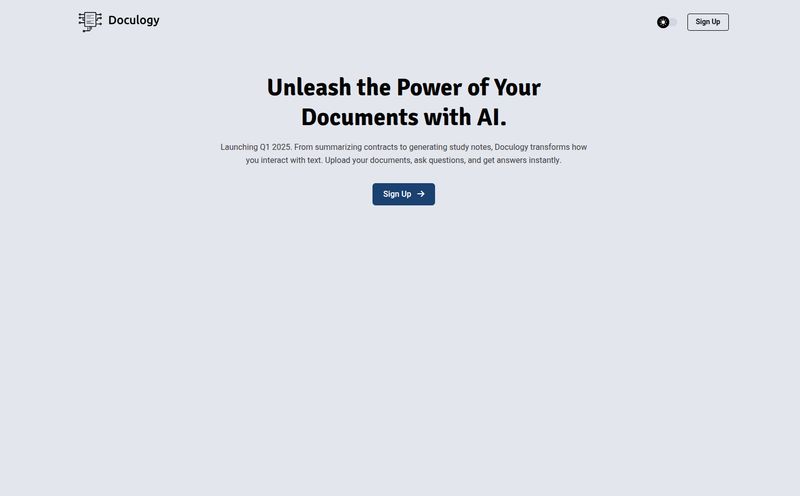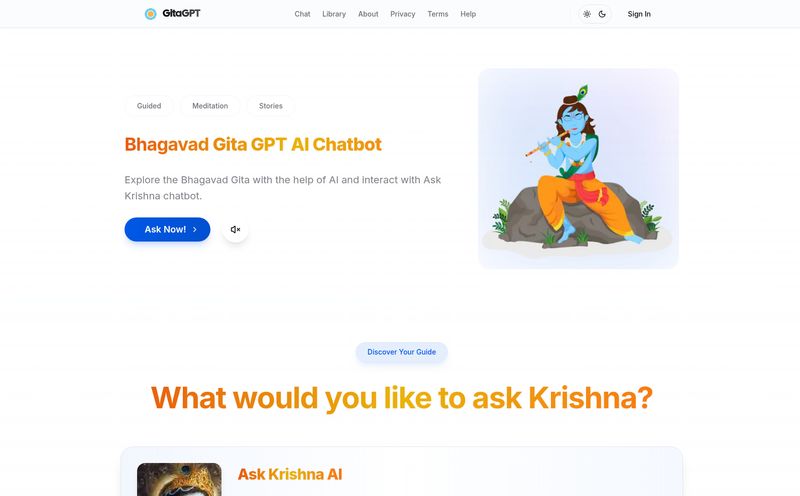You know that feeling when you hear a rumor about a cool new tool? A whisper in a Slack channel, a mention on a forum. You get a little spark of excitement. Maybe this is the thing that will finally streamline your workflow, solve that nagging problem, or just be a fun new toy to play with. That was me last week when the name Wynter.ai crossed my screen. The description was tantalizing: a suite of AI-enhanced tools for web developers, built on 20 years of experience. Sounds great, right?
So I did what any of us would do. I opened a new tab, typed in the URL, and hit Enter.
And I got… nothing. Well, not nothing. I got a crisp, clean, and utterly disappointing “Page not found” error from Netlify. A digital dead end.
Now, I could have just closed the tab and moved on. The internet is littered with dead links and forgotten projects. But something about this one stuck with me. The promise had been so specific, so aligned with what so many of us in the SEO and dev space are looking for. So I decided to do a little digital archeology. What was Wynter.ai? And where did it go? What I found is a story not just about one platform, but about the frantic, exciting, and sometimes brutal reality of the current AI gold rush.
What Was Wynter.ai Supposed to Be?
Piecing together the digital breadcrumbs, Wynter.ai wasn’t just a single tool. It was envisioned as a complete ecosystem. Think of it as a workshop for the modern web creator, where every drawer is filled with some new AI-powered gadget. It was meant to be a blend of old-school web developent wisdom and new-school AI muscle.
The platform’s big promise was to offer a whole range of resources. We’re talking about things like:
- AI-Powered Chatbots: Custom bots to enhance user experience on your own sites.
- Expert-Crafted Prompts: A library of pre-made, high-quality prompts for both ChatGPT and Midjourney. This is a big one. Anyone who’s spent an hour trying to get the perfect image out of Midjourney knows that prompt engineering is a real skill.
- Web Development Tools: A grab-bag of goodies including Chrome extensions, ElectronJS apps, and even WordPress plugins.
Basically, it sounded like a dream for anyone who builds, manages, or markets websites. The idea of having a single place for AI-driven development and content creation is incredibly appealing. We’re all drowning in subscriptions and bookmarks for a dozen different AI tools; a unified platform is a powerful concept.

Visit Wynter.ai
The All-in-One Dream: The Good Stuff
On paper, the advantages were obvious. The biggest draw for me was the combination of expertise. It wasn’t just another quick AI wrapper. The claim of “20+ years of web development experience” suggests a solid foundation. It implies the tools would be built by someone who actually understands the real-world problems developers face, not just someone chasing the AI trend.
And the free prompts? A brilliant move. Giving away high-quality prompts for services like ChatGPT is a fantastic way to build community and showcase value. It’s a classic lead magnet, a way to say, “Here’s a taste of what we know, for free. If you like it, stick around for the main course.” I’ve always felt that the most successful toolkits are the ones that teach you how to be better at your job, not just the ones that do it for you.
The platform also seemed to hint at training courses and a membership model, which is a smart way to structure this kind of offering. It creates a path from free user to dedicated community member. It’s a model that works, when it works.
Cracks in the Foundation: Reading the Warning Signs
So if the idea was so good, what happened? As I dug deeper, I found some clues in the project's own description of its potential downsides. It’s like the ghost telling you how it died. And this is where the story gets really interesting for anyone building or buying into the AI hype.
Here were the self-admitted cons:
- Some tools may be prototypes or side projects. This is the big one. The flashing red light. It suggests that Wynter.ai might not have been a full-time, venture-backed company, but rather one person’s (or a small team’s) ambitious side hustle. Side projects are born from passion, but they often die from a lack of time and resources.
- Reliance on third-party APIs (e.g., OpenAI). This is the tightrope every AI tool walks. Building your service on top of another company’s tech means your fate is tied to theirs. If they change their API, raise their prices, or shift their strategy, your entire business model can break overnight. We've all seen it happen.
- Some resources may be outdated (e.g., FunnelPlugins blog is closed). This was another breadcrumb. A reference to another, already-closed project. It paints a picture of a creator with lots of ideas, but maybe not enough runway to keep them all airborne.
When you put these clues together with the “Page not found” error, the picture becomes clear. Wynter.ai was likely a brilliant, ambitious project that, like so many others in this space, just couldn’t sustain itself. It’s a digital ghost town—the signs are still up, promising the best AI in the West, but the doors are boarded up and a digital tumbleweed is blowing through.
The Big Question – What About Pricing?
One of the missing pieces to this puzzle is the price. The data I could find had no pricing information, no link to a pricing page. Was it free? Was it a monthly subscription? We don’t know. This lack of a clear, public business model reinforces the “side project” theory. Often, developers will build the cool tech first and think about monetization later. It’s a fun way to work, but not always a sustainable one.
My guess? It was probably heading toward a freemium model. Free prompts and basic tools to draw you in, with a paid membership or course to unlock the really powerful stuff like the custom chatbots or advanced apps. It’s a shame we’ll never get to see it fully realised.
So, Is Wynter.ai Dead? And What Can We Learn?
Yeah, I think it’s safe to say the public-facing version of Wynter.ai is gone. But its story is a perfect case study for the times. The AI explosion is incredible, but it’s also creating a bubble of tools. For every stable, long-term platform, there are a hundred brilliant ideas that burn bright and fast before disappearing.
For users, the lesson is to be a little cautious. Before you integrate a brand-new, unproven AI tool into your core business operations, do some digging. Is it a side project or a fully supported company? Who is behind it? How long have they been around?
For creators, the story of Wynter.ai is a cautionary tale with a silver lining. The idea was fantastic. The scope, however, might have been too ambitious for a small operation. Maybe the lesson is to start smaller. Launch one great tool—the best Midjourney prompt library, for instance—and build from there, rather than trying to build the entire ecosystem at once. It's less glamorous, but it’s a lot more likely to survive.
Frequently Asked Questions about Wynter.ai
- What was Wynter.ai?
- Wynter.ai was an ambitious platform designed to offer a suite of AI-powered tools and resources for web developers and marketers. This included AI chatbots, expert prompts for ChatGPT and Midjourney, Chrome extensions, and other web development apps.
- Why can't I access the Wynter.ai website?
- The website currently shows a “Page not found” error, which strongly suggests the project is no longer active or has been taken offline. Based on its own description, it may have been a collection of side projects that was not sustained.
- Was Wynter.ai a free service?
- It's unclear. While it offered free resources like AI prompts, it also mentioned training courses and membership, hinting at a potential freemium or subscription model. No definitive pricing information is available.
- What kinds of tools did Wynter.ai offer?
- It claimed to offer a wide variety, including custom AI chatbots, pre-built prompts for generative AI like ChatGPT and Midjourney, WordPress plugins, Chrome extensions, and even full applications built with ElectronJS.
- Who was behind Wynter.ai?
- The platform was promoted as being built on over 20 years of web development experience, but specific information about the founder or company is scarce now that the site is down. This points to it likely being a solo or small team project.
- Are there any good alternatives to what Wynter.ai promised?
- Yes, absolutely. While there isn't one single platform that does everything Wynter.ai aimed to, you can find excellent specialized tools. For prompts, sites like PromptBase or FlowGPT are popular. For AI development tools, exploring GitHub and individual SaaS products is your best bet.
A Final Thought on Digital Ghosts
I have a soft spot for projects like Wynter.ai. They are born from genuine excitement and a desire to build something cool and useful. They are the digital equivalent of a band’s unreleased demo tape—full of potential and raw energy. While it’s a bummer that it’s gone, its ghost serves as a great reminder. A reminder of how fast the tech world moves, how fragile new ideas can be, and how important it is to build, dream, and sometimes, to learn from a noble failure. Here's to all the ambitious projects, both the ones that make it and the ones that become digital ghost stories.
References and Sources
For further reading on the topics discussed, you might find the following resources useful:
- OpenAI: The organization behind the APIs that power many modern AI tools.
- Netlify Support Guide: Information on why a "Page Not Found" error might occur on the Netlify platform.
- PromptBase: An example of a marketplace for AI prompts, a similar concept to one of Wynter.ai's proposed features.



